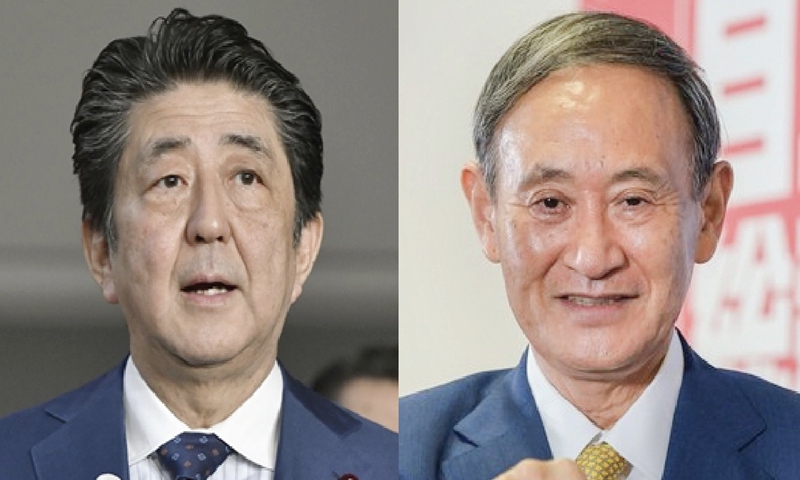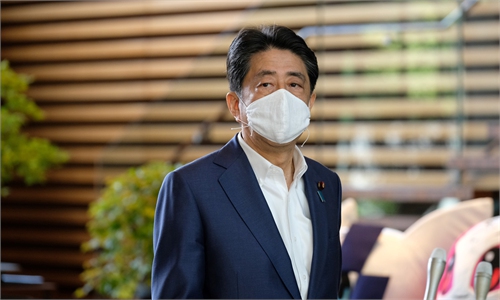Visits to Yasukuni shrine don’t necessarily indicate militaristic trend in Japan

Photo: GT
Former Japanese prime minister Shinzo Abe paid a visit to the Yasukuni Shrine on Monday. "I visited the shrine to show my sincere respect to the spirits of the war dead," Abe said. During Abe's two tenures as prime minister, he visited the Yasukuni Shrine in person only once in 2013. But this is already his second visit since his resignation.Abe did not pay too many visits to the Yasukuni Shrine as prime minister, because he did not want to excessively arouse diplomatic conflicts with China and South Korea. Back then, Japanese right-wing forces may have been disappointed in Abe. But now, with his visits to the shrine, Abe has made clearer his political and historical views. Abe is trying to show the Japanese right-wing forces that his understanding of Japan's aggressive wars is the same as theirs.
Another reason behind Abe's visits to the controversial shrine since his resignation is that he may want to attract attention. In addition to Abe's health problems, there may be other reasons why he resigned. For example, Japan's economic downturn was too severe to see a U-turn in the short run. As the world's third-largest economy, Japan's GDP contracted by an annualized 3.4 percent in the first quarter of 2020, and 27.8 percent in the second quarter. The recession is almost unstoppable.
Worse, Abe's epidemic prevention efforts seemed to be ineffective. It was difficult for the Abe administration to control COVID-19 and restart the Japanese economy. Thus, he may have chosen to resign in the hope of making a comeback someday in the future. So Abe went to visit the Yasukuni Shrine twice after resigning, trying to impress the Japanese right-wing forces.
In addition to Abe's visits, incumbent Japanese Prime Minister Yoshihide Suga on Saturday sent an offering of a potted plant to the Yasukuni Shrine to mark a two-day autumn festival. This shows that Suga, a former Japanese chief cabinet secretary, wants to fully inherit Abe's internal and diplomatic policies. Suga's political attitude is also in line with that of Abe's. Now, as Japanese prime minister, Suga is likely to follow the same path and try to win the support of the right-wing forces. This is why he sent an offering to the Yasukuni Shrine, showing his attitude on historical issues.
Such moves will have an impact on Japan's relations with China, South Korea and other Asian countries. It seems that Japan is ready to risk almost everything on historical issues, as if it believes other countries can do nothing about it.
Japan has expressed its willingness to improve relations with China, and Suga said in September that Japan attaches great importance to China and regards Japan-China relations as one of the most important bilateral relationships. But Japanese politicians' recent moves show that Japan may still want to maintain a certain political distance from China.
However, visiting the Yasukuni Shrine does not necessarily mean that Japan will again move on to the path of militarism. Militarism represents centralized domestic governance and launching aggressive wars against other countries. We need to admit that Japan has now been transformed into a democratic country. Also, we have to admit that today's Japan seems to have no ambitions for wars of aggression.
It now appears that paying visits to the Yasukuni Shrine and sending offerings to the shrine are more of a symbol to show Japanese politicians' right-wing tendencies. These moves are also a tool to boost domestic morale, unite the Japanese people and increase these politicians' support rate.
This is also the case for Suga. For him, sending an offering to the Yasukuni Shrine is a symbolic move. Although his view of history is similar to that of Abe, he will not be more right-leaning than Abe because unlike Abe, who comes from a prominent political family, Suga does not have such a family burden. Thus, it is unlikely that the Suga administration will keep hyping historical issues in the future.
The article was compiled by Global Times reporter Li Qingqing based on an interview with Zhou Yongsheng, deputy director of the Japanese Studies Center at China Foreign Affairs University. liqingqing@globaltimes.com.cn

